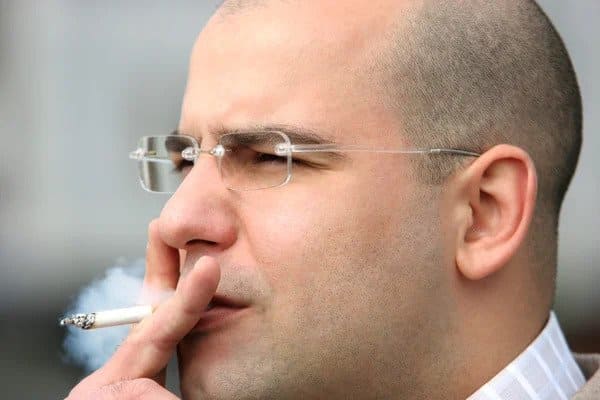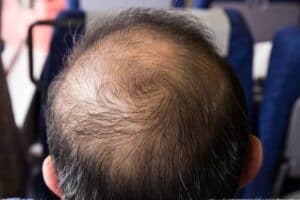Have you ever wondered if hair loss causes smoking? Have you begun to notice hair loss on your pillow or hairbrush? In this article, you will find everything you need to know about hair loss, hair growth, and if smoking causes hair loss?
Hair Loss: Why Does It Happen?
Before we answer the all important question, “does smoking cause hair loss”, it’s first important to understand why we lose hair and whether cigarette smoking is a primary cause of hair loss, or an aggravator of existing hair loss conditions.
Believe it or not, all of us experience hair loss symptoms every single day. On average, every person will lose between 50-150 hair follicles from their scalp without even noticing. However, we say someone “suffers with hair loss” (or telogen effluvium) when hair regrowth cannot keep up with hair loss.
The hair growth cycle of your hair follicles are split into three phases: anagen phase (growth), catagen phase (shedding), telogen phase (resting). When more hairs are in the resting phase than the growth phase, then this is categorised as hair loss.
There are many different types of hair loss that people can suffer with. From genetic hair loss conditions (male pattern baldness and female pattern baldness) to medical conditions (hair loss and chemotherapy etc) to environmental factors (like smoking!), all of these have an effect on your overall hair health!
Does Smoking Cause Hair Loss?

The relationship between smoking and hair loss has been studied for many decades now. However, there is still no definitive answer as to whether smoking is a “cause” of hair loss, or an “aggravator”.
In a paper written by Trüeb (2003), he argues that the change in blood flow around the dermic layer was likely responsible for a number of health detriments, two of which were premature skin ageing and hair loss.
What’s even more alarming is that losing hair from smoking can worsen existing symptoms of hair loss. So, if a man is already suffering with deep recession into the temples, smoking could bring on balding scalps or vertex balding. For more information on this, read our article on the Hamilton Norwood scale.
So, smoking may speed up the ageing process and worsen symptoms of hair loss. In extension, it may not be too much of a stretch to say that this may even worsen genetic hair loss conditions like androgenetic alopecia.
How Does Smoking Cause Hair Loss?
According to Kavadya et. al (2022), smoking can cause hair loss due to vasoconstriction of the blood vessels on the scalp. In other words, blood flow to the scalp is reduced, meaning your hair follicles do no receive all the blood and nutrients they need.
Just like the rest of your body, your hair follicles need a range of nutrients to remain happy and healthy. All of these nutrients are passed on through the blood. As soon as the blood flow is restricted, this can negatively impact hair growth.
What Type of Hair Loss Does Smoking Cause?
If smoking causes impaired blood flow to the scalp, then this can have a number of detrimental effects of people who are already suffering with other types of hair loss. Smoking is also believed to accelerate, perhaps even cause, early onset androgenetic alopecia.
Cigarette smoking can actually worsen hair loss conditions such as:
- male pattern baldness
- female pattern hair loss
- alopecia areata
- retrograde alopecia
So, if you’re not looking to accelerate hair loss, then it may be a wise idea to quit smoking as this can help prevent hair loss and produce healthy hair in the future.
What Other Effects Does Smoking Have On My Overall Health?
It goes without saying that the toxic chemicals found in tobacco smoke can have an adverse effect on your overall health as well. Aside from hair loss, smoking cigarettes may also affect your hair follicles in other ways.
Premature Hair Greying
believe it or not “smoker’s hair” is a condition on which plenty of research has been conducted. Zayed et. al (2013) found “a significant relation (with adjusted odds ratio of two and half) between onset of grey hair before the age of 30 and cigarette smoking.”
Lung & Oesophagal Cancer
There are a number of reasons for quitting smoking. Perhaps the most important reason is that it lowers your risk of cancer in the future. Cigarette smoke is a known carcinogen, so if you stop smoking, thinning hair isn’t the only condition you need to worry a little less about!
Worse Cardiovascular Health
As well as affecting healthy hair, the toxic chemicals in cigarette smoke can cause a buildup of plaque on the heart, increasing your risk of heart disease. Breaking your smoking habit could dramatically reduce this risk as well.
Will Quitting Smoking Help My Hair Regrowth?
If you’re looking to stop smoking, then there is quite a high likelyhood that your hair will grow back naturally. However, this is very much dependent upon the hair loss condition that you’re suffering with.
If you suffer with temporary hair loss, then there is a high likelihood that your hair follicles will begin their growth phase again. This rebooting of the hair growth cycle can help drastically as well as improve your hair’s health.
However, in cases where smoking tobacco has worsened preexisting conditions, like premature greying or pattern baldness, then your hair is unlikely to grow back in the future. In these cases, hair transplantation may be the only option if you are looking to let your hair grow in previously bald places.
That being said, just because your hair follicles may not make a full recovery, it’s definitely wise to consider quitting smoking altogether. By not smoking tobacco, this can greatly improve blood pressure, improve the body’s immune system, and reduce your risk of cancer.








